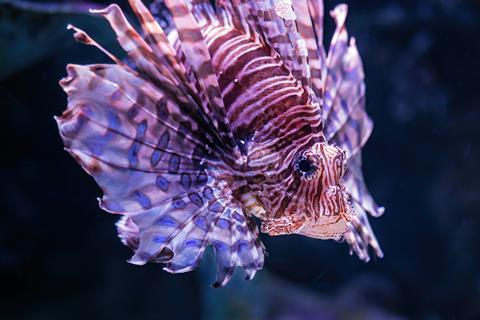A scorpionfish protein could prove a powerful tool for treating multidrug-resistant bacterial infections in people with cystic fibrosis, shows a preliminary study published in eLife.

The study suggests this approach for treating chronic bacterial infections in patients with cystic fibrosis may also help reduce excessive immune activity in the lungs, and could also be applied to other types of drug-resistant bacterial infections.
People with cystic fibrosis have a genetic variation that causes thick mucus to build up in their lungs and predisposes them for chronic bacterial infections of the airways, most frequently caused by Pseudomonas aeruginosa.
Multiple drug resistance
“In these cases, patients need continuous antibiotic treatment, which often leads to the development of multiple-drug resistance,” says Jonas Holzinger, biologist at the Institute of Clinical Microbiology and Hygiene, University Hospital Regensburg, Germany. “In consequence, therapeutic options are drastically limited and there is an urgent need for new approaches.”
Humans and other organisms produce a protein called bactericidal/permeability-increasing protein (BPI) that can destroy Gram-negative bacteria. However, the immune systems of most people with cystic fibrosis produce antibodies that inactivate BPI, worsening their prognosis.
In their study, Holzinger and colleagues looked at versions of the BPI protein produced by distantly related creatures to see if they could kill Gram-negative bacteria from patients with cystic fibrosis while dodging the patients’ anti-BPI antibodies.
Escaping detection
The team selected BPI from the scorpionfish Sebastes schlegelii for further study. They found that the scorpionfish BPI escaped detection by BPI autoantibodies derived from patients with cystic fibrosis and displayed surprisingly high antimicrobial potency against Gram-negative bacteria.
“When we compared scorpionfish BPI to those of other organisms, we discovered its exceptional activity against Pseudomonas aeruginosa,” Holzinger says. “Scorpionfish BPI also worked impressively fast, killing the bacteria within one to three hours.”
The team also showed that scorpionfish BPI binds to and destroys the rigid cell wall that gives structure to existing bacteria, a mechanism which differs from that of commonly applied antibiotics.
Broader applications
Preclinical studies in animal models of cystic fibrosis are needed to confirm if scorpionfish BPI is an effective and safe treatment for Gram-negative bacterial infections in the lungs. If successful, the authors say this treatment approach could have broader clinical applications.
“If proven effective in animals and people, non-human BPI may provide new therapeutic options for difficult-to-treat bacterial infections,” concludes Sigrid Bülow, MD, Specialist for Microbiology at the Institute of Clinical Microbiology and Hygiene, University Hospital Regensburg.
“Developing non-human BPI therapies may benefit not only patients with cystic fibrosis but others impacted by severe infections with multiple drug-resistant Gram-negative bacteria.”







No comments yet